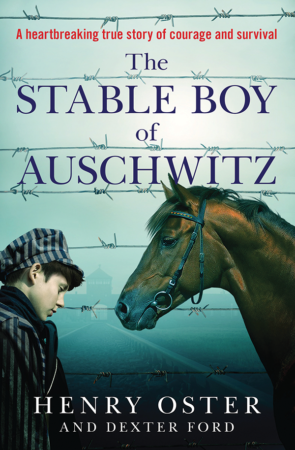One way or another, you’ll get by.
That’s the thing about you: you’re resourceful. You’ll always figure out a way to survive, to work around a problem, to slap on a bandage and keep moving. You never fail to find a way, and in the new book “The Stable Boy of Auschwitz” by Henry Oster and Dexter Ford, that will save your life.
For many years, Dexter Ford was a patient at Dr. Henry Oster’s optometry office and eventually, Oster “became a friend.” One day, Ford noticed a faded blue tattoo on Oster’s forearm and when he asked about it, Oster told him a story…
Heinz Adolph Oster was an only child, and he and his parents lived in relative affluence in the German city of Cologne. His father was a respected war hero but when Hitler came to power, it mattered not: the Osters were Jewish.
On his first day of school, young Oster was a victim of Nazi violence; not long afterward, his family lost their home and Oster’s father was “forced into slave labor.” When he was twelve years old, Oster’s family was sent to a ghetto in Poland to live a two-room flat with almost two dozen other people. Because he could speak German — a rarity among Polish Jews — young Oster survived by being a Nazi messenger, a “runner.”
“The Lodz ghetto,” he says, “was essentially a waiting room for death.”
It was where Jews were held before being sent to Buchenwald, Auschwitz, or Treblinka. It was where Oster’s father died, his corpse left outside to be carted off.
In August of 1944, Oster and his mother were sent to Auschwitz, where they were separated and he watched her being dragged to her death. In the camp barracks there, he learned to take life-or-death risks to live. He found kindness in slivers between horrors, and a camp assignment that briefly soothed his soul…
That historical novel you’ve been reading? Put it away and don’t bother bringing the bookmark that’s in it. You won’t need it. “The Stable Boy of Auschwitz” is true, and it’s too riveting to put down.
If you ever thought that little things are insignificant, here’s a story to read. Author Dexter Ford shares Henry Oster’s tale of close-calls, near-misses, fortuitousness, and small graces that gave Oster enough succor to survive that which was “inconceivable.” They begin with a brief-but-thorough history of how Nazism rose, and the Holocaust started, and that’s chilling — partly because we know, and we know what’s to come.
Fear and dread are everywhere on those pages but it’s tempered, surprisingly, by the audacity of Oster-as-a-boy. Despite the horror that Oster-as-adult relays, deep senses of resignedness, hope, and resourcefulness are embedded strongly in this tale, right through to the crushing, terrible relief that is its ending.
Absolutely, hand this to your teenager to read, and if you’ve got an Anne Frank or an Elie Wiesel book nearby, add “The Stable Boy of Auschwitz” to that pile. Indeed, this is not a book to pass by.
By Terri Schichenmeyer
“The Stable Boy of Auschwitz” by Henry Oster and Dexter Ford
c.2023, Grand Central
$13.99
244 pages




